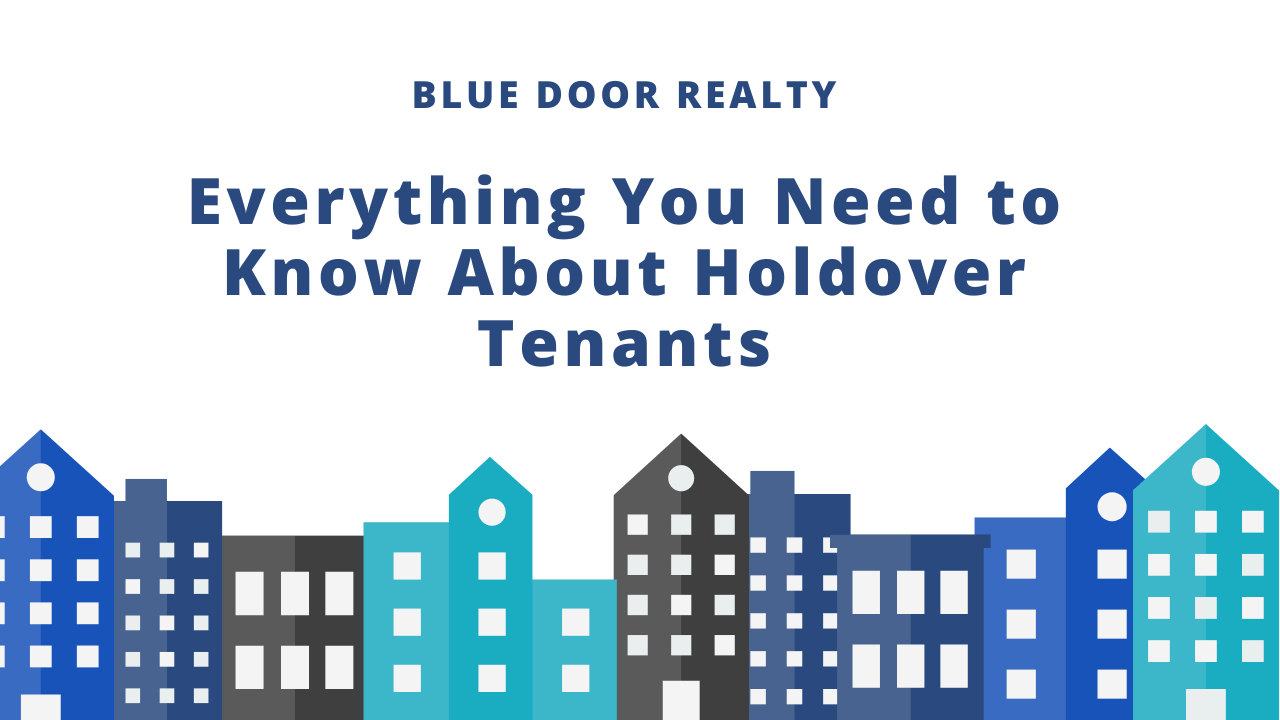In an ideal world, the end of a tenancy would be a simple process. Tenants should vacate your property on the agreed dates, so you are able to perform a move-out inspection and an end-of-tenancy cleaning before welcoming a new tenant. Unfortunately, tenants overstaying their welcome even after their lease period has expired is a problem many landlords may have to deal with.
Having a tenant stay on your property after their lease is up may seem like a great way to avoid vacancies and maintain a steady source of income. However, it can be very risky. In this article, the experts at Blue Door Realty will go over everything you should know about holdover tenancies.
What Is a Holdover Tenant?
A holdover tenant is a lessee that chooses to stay on a rental property after their original lease agreement expires. This can happen whether you rent out your rental property in the short or long term.

The biggest issue with holdover tenants is that they are legally allowed to continue occupying a rental property for as long as the property owner or landlord accepts rent payments from them even after the lease term.
Top Risks of a Holdover Tenant
Allowing a tenant to remain on your property after the lease period expires can lead to many issues in the long run, such as loss of income and property damage. Below is a list of the top risks of allowing a holdover tenant in your rental.
No Proper Lease Agreement
Allowing a holdover tenancy means that there won’t be a proper lease moving forward. This can poorly affect your business in the long run. Since you won’t have a set end date for the tenancy and lease, you won’t be able to prepare for a vacancy once the tenant decides to leave your rental.
Plus, you won’t have the peace of mind of knowing that your tenants will take good care of your home since there’s no written agreement to do so.
Higher Maintenance Costs
Landlords usually perform scheduled maintenance when a tenant moves out. This is a simple way to ensure that the rental is in good shape. Plus, it can help you spot problems before they turn into big, costly repairs. Maintenance costs can add a lot of money to hidden costs landlord’s don’t notice.

However, if a tenant occupies your property after their lease expiration date, you’ll have to postpone maintenance tasks. This will leave your rental open to property damage, which will cost you more and can decrease the value of your property in the long run.
Legal Uncertainty
Holdover tenancies exist in a legal space between a original lease or rental agreement and trespassing. To deal with a holdover tenant, you’ll have to do your research and understand your state and local laws. Hiring a professional property manager who is well versed in the local laws can be a great way to simply deal with a holdover tenant.
No Rent Increases
A holdover tenant doesn’t sign a new lease. So, you can’t change the terms of their previous agreement or increase their rent price. You may try to charge a higher rent to let them stay on your property, even without a proper lease agreement. But, this is risky because doing so can be against your local laws regarding holdover tenants.
Missed Opportunities
A holdover tenant can make you lose out on finding new and better tenants, also ruining your chances of growing your wealth by upgrading your rental property to attract better renters or selling the property.
Tips for Handling Holdover Tenants
Every situation involving a holdover tenant is different, but the following tips can help you put an end to holdover renters or tenants and minimize risks to your rental property:
- Let them stay month-to-month. If a landlord wishes to accept further rent payments and doesn’t want to have a vacant rental, they can let a holdover tenant stay on the condition that they sign a month-to-month lease and continue a periodic tenancy. This way, they’ll be able to ensure that their property is still taken care of and that rent is paid every month.

- Ask them to vacate the property. To avoid holdover tenancy, you should stop accepting rent payments from tenants whose lease term has expired. Then, you should ask the holdover tenant to move out and treat them as trespassers.
- Start an eviction process. If they refuse to vacate your property, you’ll have to evict a holdover tenant. Although it can be time-consuming, an eviction will let you regain full control of your property.
- Sue for damages. Once a holdover tenant has finally left, you should try to make up for the time and money you’ve lost because of them. In almost all states, you are allowed to withhold their security deposit to pay for damages to your property. You can even pursue tenants in small claims court for missing rent or damage costs.
Tips for Avoiding Holdover Tenants
As a landlord, it’s best to avoid holdover tenancies completely. If a tenant wants to keep living in your property after their lease expires, you should talk to them and convince them to renew or extend their lease.
If they do, you can draft a new lease. Whether they opt to renew for a long-term or month-to-month agreement, you’ll have the peace of mind of knowing that your rental will be safe.
If they don’t, you’ll have to ask them to move out once their lease is up. If they don’t move out by the agreed date, don’t accept any rent payment from them moving forward. Depending on the situation, you might have to treat them as trespassers or go with eviction proceedings.
Bottom Line
If you have any more questions about holdover tenants, tenancy or the eviction process in New Mexico, contact Blue Door Realty! Our team of dedicated professionals will offer you the guidance you need to protect yourself and your investment from holdover tenants.

